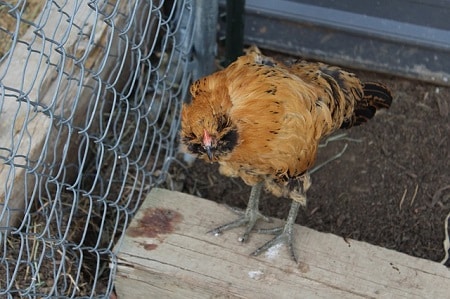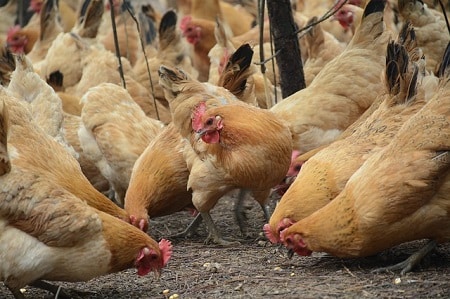You’ve spotted lice crawling around on one of your chickens while handling her, and you’re freaked out.
Don’t worry, we’ve all been there.
Can people get lice from chickens? Should you be worried about becoming infested or bitten by the lice you’ve seen on your hens?
In a word - No.
Poultry lice and human lice are two very different parasites. Chicken lice need chickens to feed off and stay alive. Just as human lice need humans to feed off and stay alive.
You shouldn’t experience anything more than a little bite at worst. Here’s everything else you need to know about these annoying little insects:
Table of Contents
What Are Poultry Lice?
Poultry lice are parasites that live on chickens and feed off their feathers and skin. There are a few different types of chicken lice, about 8 that are well known. All of them live externally and are relatively easy to spot and treat.
The most common types are small but can be seen by the naked eye. They have 6 legs, no wings, and are usually yellow to brown in color.
They are easy to spot if you inspect your chicken. Just give your girls or roosters a thorough look over, lifting their wings and parting their feathers with your hands if you want to check for lice.
Can Lice Kill Chickens?

Lice can kill chickens, yes. It’s rare that a chicken will die from a lice infestation though, they’d probably have to already be weak and not receive any help treating the lice.
If a chicken has a large number of lice on them the volume of bites and toxicity from the parasites will overwhelm their immune system eventually.
The early signs are itching, loss of feathers and a patchy coat, and a chicken will eventually develop anemia.
Can You Get Lice From Chickens?
The good news is that people cannot get lice from chickens. At least, the lice are not able to live on us, that’s for sure.
This is because poultry lice feed on feathers and chicken skin, two things we can’t provide for them. They also hold on to a chicken’s feather shaft and lay eggs near the base on the shafts.
If one of your chickens has lice and you’re handling them, you might feel or see lice moving on to you. They might even have a nibble too and leave a red mark.
Parasites will try and live off any host they find themselves on, they are horrible little creatures. You’ll find them dead within a day if they’re not feeding on the stuff they need from a chicken though.
How Long Can Chicken Lice Live on Humans?
If you’re concerned that some lice have made their way into your home, on your clothes, or even on you, don’t worry.
They will not live for more than 24 hours on you. There is literally no risk of lice infesting you or doing you any harm. Poultry lice are very different from the lice that can live on us.
How Do Chicken Lice Spread?

Chicken lice spread like most lice do, by hopping from host to host and laying more eggs. They have a very short life cycle - approximately 2-3 weeks.
Lice start off as nymphs and spend a week or so in this stage before becoming an adult. Adult lice can lay a couple of eggs a day for the next week or so, which explains how they can spread in numbers so quickly.
Poultry lice prefer to stay on the same host for their short life. But they will move onto another hen if they fall off or feel the need. This can happen when two birds are next to each other, or if they share a nest box.
How Do Chickens Deal With Mites?
If you’ve never had a problem with mites and lice in your flock, this is because for the most part chickens are able to deal with small numbers of them themselves.
The main way they deal with lice is by having a dust bath. If you own chickens, you will have seen them rolling around in loose dirt in a small hole they’ve dug out.
By rolling around and flapping their wings they’re able to flick some lice off. The cloud of dust they’re working up will also suffocate and dry up some of the mites on their skin and in their feathers.
It’s also a way they give themselves a general clean. It helps to preen their feathers and distribute oils over their bodies, it’s one of the small miracles chickens perform that’s essential to their wellbeing.
This is one of the reasons why injured or brooding hens are more prone to lice. They will be bathing less, giving parasites a chance to increase in numbers.
In Summary
I know how alarming it is to find mites, lice, or some other parasites on your flock. But it’s really nothing to worry about most of the time, and you’ll be able to get it under control with some basic treatments.
The best part is that you don’t have to worry about chicken or poultry lice living on you. They don’t like the taste of humans!
They can’t survive without feeding off a chicken’s feathers and skin for very long - they die within a day of not being on a chicken.




